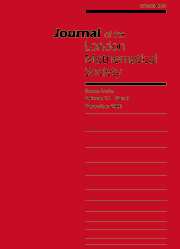Crossref Citations
This article has been cited by the following publications. This list is generated based on data provided by
Crossref.
Chaux, Caroline
Pesquet, Jean-Christophe
and
Duval, Laurent
2007.
Noise Covariance Properties in Dual-Tree Wavelet Decompositions.
IEEE Transactions on Information Theory,
Vol. 53,
Issue. 12,
p.
4680.
Drmota, Michael
Mauduit, Christian
and
Rivat, Joël
2009.
Primes with an average sum of digits.
Compositio Mathematica,
Vol. 145,
Issue. 2,
p.
271.
Mauduit, Christian
and
Rivat, Joël
2009.
La somme des chiffres des carrés.
Acta Mathematica,
Vol. 203,
Issue. 1,
p.
107.
Prodinger, Helmut
and
Wagner, Stephan
2009.
The digit generating function of a polynomial.
Journal of Number Theory,
Vol. 129,
Issue. 6,
p.
1325.
Drmota, Michael
and
Mauduit, Christian
2010.
Weyl sums over integers with affine digit restrictions.
Journal of Number Theory,
Vol. 130,
Issue. 11,
p.
2404.
Mauduit, Christian
and
Rivat, Joël
2010.
Sur un problème de Gelfond : la somme des chiffres des nombres premiers.
Annals of Mathematics,
Vol. 171,
Issue. 3,
p.
1591.
HARE, KEVIN G.
LAISHRAM, SHANTA
and
STOLL, THOMAS
2011.
THE SUM OF DIGITS OF n AND n2.
International Journal of Number Theory,
Vol. 07,
Issue. 07,
p.
1737.
Hofer, Roswitha
Larcher, Gerhard
and
Zellinger, Heidrun
2012.
On the digits of squares and the distribution of quadratic subsequences of digital sequences.
Proceedings of the American Mathematical Society,
Vol. 141,
Issue. 5,
p.
1551.
Stoll, Thomas
2013.
Combinatorial constructions for the Zeckendorf sum of digits of polynomial values.
The Ramanujan Journal,
Vol. 32,
Issue. 2,
p.
227.
Saunders, J. C.
2015.
Sums of digits in q-ary expansions.
International Journal of Number Theory,
Vol. 11,
Issue. 02,
p.
593.
Dartyge, Cécile
Mauduit, Christian
and
Sárközy, András
2015.
Polynomial values and generators with missing digits in finite fields.
Functiones et Approximatio Commentarii Mathematici,
Vol. 52,
Issue. 1,
Berend, D.
and
Kolesnik, G.
2016.
Joint distribution of completely q-additive functions in residue classes.
Journal of Number Theory,
Vol. 160,
Issue. ,
p.
716.
Spiegelhofer, Lukas
2020.
The level of distribution of the Thue–Morse sequence.
Compositio Mathematica,
Vol. 156,
Issue. 12,
p.
2560.
Liu, H.
and
Mauduit, C.
2021.
On the distribution of the truncated sum-of-digits function of polynomial sequences in residue classes.
Acta Mathematica Hungarica,
Vol. 164,
Issue. 2,
p.
360.
Liu, H.
and
Qi, Y.
2022.
The truncated sum-of-digits function of powers.
Acta Mathematica Hungarica,
Vol. 168,
Issue. 1,
p.
27.
Qi, Yuchan
and
Liu, Huaning
2022.
The truncated sum of digits function of polynomial sequences.
The Ramanujan Journal,
Vol. 59,
Issue. 1,
p.
1.




